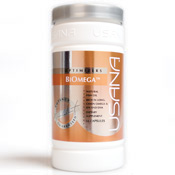FATS
“Fat” tends to be a dirty word in the vocabulary of most women, and many of us, especially those of us who are watching our weight, go to great lengths to avoid eating it. However, as with carbohydrates, there are good fats and bad fats. Your body needs good fats to ensure that, among other things, your hormones work properly and your heart and skin are healthy. Broadly, bad fats are saturated fats (such as those in red meat and processed foods) and good fats are unsaturated fates, of which some are essential fatty acids (EFAs).
Saturated fats
These block your body’s ability to absorb essential fats, and it’s known that the more saturated fat a woman eats, the higher the levels of estrogen in her blood, leading to hormone imbalance. Also, saturated fats can increase your risk of heart disease by raising your body’s cholesterol level and clogging up your arteries. They also encourage your body to produce unhealthy prostaglandins that can trigger pain and swelling in your body, and contribute to period pain, endometriosis-related cramps, and the spread of endometrial tissue.
To avoid saturated fats in your diet, cut out all red meat and keep your consumption of dairy products, butter, and palm oil to a minimum. You can help counter the negative hormonal effects of the saturated fats that you do consume by taking a probiotic supplement, which can help control levels of estrogen in your gut.
There is one exception to the saturated-fat rule and that’s butter. Although butter is high in saturated fat, the alternative – margarine – often contains hydrogenated vegetable oil. The process of hydrogenation makes fat more solid and easy to spread, but it also turns harmless unsaturated fats of vegetable oil into trans fats, which are most deadly than saturated fats and have been linked to causing heart attacks. So instead of hydrogenated margarine, you use organic butter, but only in moderation.
Unsaturated fats
A healthy diet needs to include unsaturated fats, which come in two forms – monounsaturated and polyunsaturated. Monounsaturated fats (also known as omega-9 fats) are fatty acids that research shows lower levels of bad (LDL) cholesterol in the blood and raise good (HDL) cholesterol. Polyunsaturated fats comprise two EFAs: omega-6 and omega-3. (EFAs are those fats the body can’t manufacture for itself, so we have to get them from food).
It’s often found that most women have too much omega-6 and not enough omega-3 fats, even to the point at which they may be deficient in omega-3. Found in oily fish and certain nuts and seeds such as flax seeds, walnuts, and pumpkin seeds, omega-3 fats are important for your circulation and cardiovascular health, boosting your immunity and moisturizing your skin cells to keep them soft ad supple. They also act as an anti-inflammatory to help relieve painful joints and the pain of arthritis.
Omega-6 fats, found in avocados and evening primrose and borage oil, and in nuts and seeds, can also reduce inflammation and improve the flow of blood through your circulatory system. So, if they have these good effects, how can we have too much? Unfortunately – and paradoxically – the body can convert omega-6 fats into substances that can increase blood clotting and produce yet more inflammation. These substances are called prostaglandins, and they can be “good” (derived from omega-3 fats) and “bad” (derived from omega-6 fats). The “good” prostaglandins are anti-inflammatory and anti-clotting, whereas the “bad” ones can create more inflammation and pain in the body, increasing the likelihood that you will, for example, suffer from period pains.
Sadly, the Western diet is often severely lacking in EFAs, so try to eat foods rich in them every day. Good sources include leafy green vegetables such as kale and cabbage; nuts; seeds; flax seed oil; hemp seed oil; and oily fish, such as salmon, herring, sardines, and mackerel. Fresh tuna is also a rich source of EFAs and, although there are concerns about the mercury levels in some fish, the benefits of eating fresh tuna far outweigh any concerns.
Another way to make sure you’re getting enough EFAs is by supplementation. However, avoid cod liver oils, which tend to be high in toxins and mercury (which the fish accumulate in their livers while in the sea) and instead buy fish-oil capsules from companies that check their fish-oil supplements for contamination. If you prefer not to take fish oil, you can get omega-3 fatty acids from flax seed oil capsules.

USANA Fish Oil supplements USANA BiOmega formula contains ultra-pure, highly concentrated omega-3 fatty acids, EPA and DHA, in a convenient capsule form, allowing you to get your full daily complement in only two capsules.

